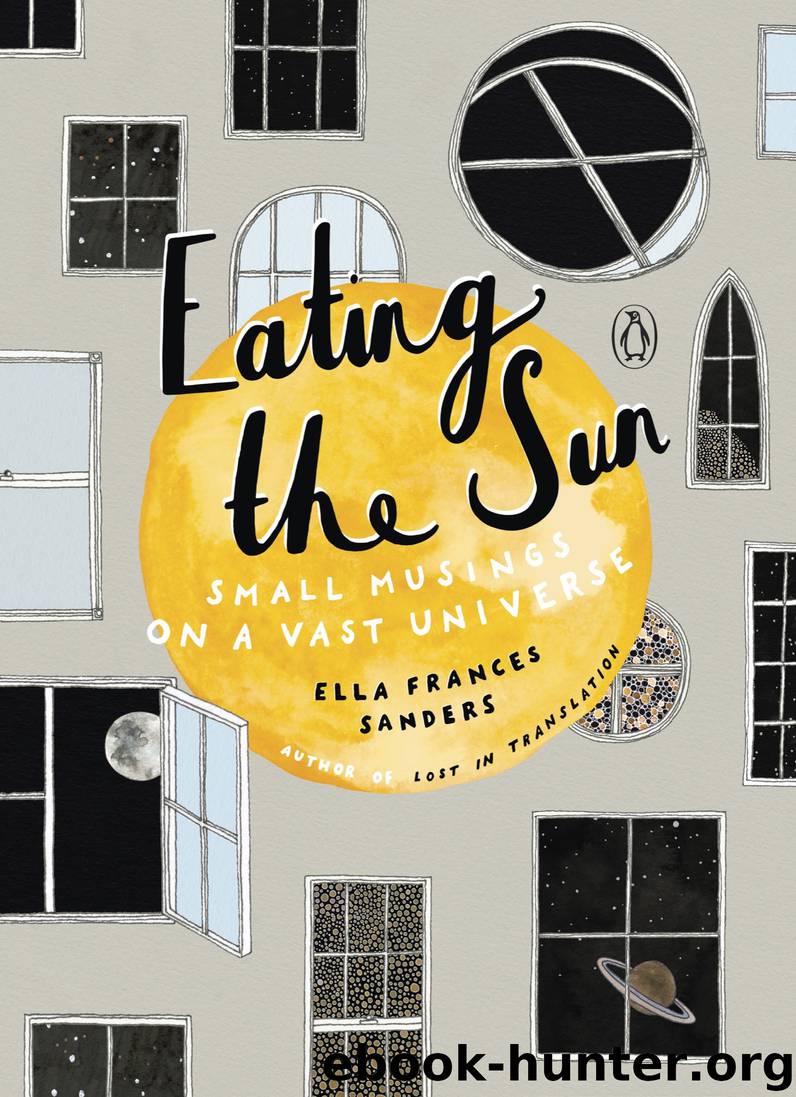Eating the Sun by Ella Frances Sanders

Author:Ella Frances Sanders
Language: eng
Format: epub
Publisher: Penguin Publishing Group
Published: 2019-04-15T16:00:00+00:00
THEORIES ARE NOT GUESSES
There is a fair amount of misunderstanding when it comes to the terms scientists use to explain and organize things. The words they employ are often the same as those we use somewhat thoughtlessly every day, but the definitions can differ wildly. For instance, for most nonscientists, the word “theory” would likely mean a guess, a hunch, some vague speculation about something or other. Not so in science, where “theory” refers to an incredibly well-established explanation, a scientific theory, one that is unlikely to be altered much by new evidence, that has been confirmed repeatedly through observation, or experiment.
Good examples of scientific theories include the big bang theory, Darwin’s theory of evolution, Einstein’s theories of relativity, and the theory of everything. These theories cannot normally be reduced to one sentence or statement, or one neat and tidy equation, but they do represent, often with astonishing clarity, fundamental things about the ways in which nature works.
Another common misconception is that theories turn into laws when they have been subjected to enough research, enough evidence, and time. This isn’t at all the case, and scientific laws and scientific theories are not in any way interchangeable. A law in science is the description of an observable phenomenon, but it doesn’t explain why it exists. It’s a scientific theory that attempts to cleanly provide the most logical explanation as to why a phenomenon is the way that it is. To put it simply: laws predict what happens in the universe; theories propose why.
It is perhaps also worth noting that hypotheses are not guesses of either a wild or an educated nature, not stabs in the dark. When scientists form hypotheses, they are basing them on existing scientific knowledge, on prior experience, on observations and logic. They are the proposed explanations for a fairly narrow set of happenings, while theories are broader, consisting of one or more hypotheses, all of which would have been exposed to rigorous and repeated testing.
Although a scientific theory being overturned completely is a near impossibility, even small disproved pieces of one can be hugely valuable, as these holes then frequently lead to newfangled discoveries, ones that were previously unimaginable. Because each reworking of a theory will contain more knowledge, more analytical oomph than the last, our understanding of things can become more accurate and embellished over time.
That is really what science is—fluctuation, a process of reconfiguration of observable truths, something that challenges our most deeply held assumptions and wreaks a delightful havoc with common sense.
Download
This site does not store any files on its server. We only index and link to content provided by other sites. Please contact the content providers to delete copyright contents if any and email us, we'll remove relevant links or contents immediately.
| Aeronautics & Astronautics | Astronomy |
| Astrophysics & Space Science | Comets, Meteors & Asteroids |
| Cosmology | Mars |
| Solar System | Star-Gazing |
| Telescopes | UFOs |
Tools of Titans by Timothy Ferriss(8369)
Turbulence by E. J. Noyes(8040)
Secrets of Antigravity Propulsion: Tesla, UFOs, and Classified Aerospace Technology by Ph.D. Paul A. Laviolette(5369)
Astrophysics for People in a Hurry by Neil DeGrasse Tyson(5182)
Room 212 by Kate Stewart(5105)
Design of Trajectory Optimization Approach for Space Maneuver Vehicle Skip Entry Problems by Runqi Chai & Al Savvaris & Antonios Tsourdos & Senchun Chai(5066)
Pale Blue Dot by Carl Sagan(4996)
The David Icke Guide to the Global Conspiracy (and how to end it) by David Icke(4709)
A Journey Through Divination and Astronomy by Publishing Pottermore(4382)
Goodbye Paradise(3802)
Apollo 8 by Jeffrey Kluger(3705)
COSMOS by Carl Sagan(3618)
The Five People You Meet in Heaven by Mitch Albom(3562)
Losing the Nobel Prize by Brian Keating(3534)
How to Read Water: Clues and Patterns from Puddles to the Sea (Natural Navigation) by Tristan Gooley(3466)
Brief Answers to the Big Questions by Stephen Hawking(3430)
How to Read Nature by Tristan Gooley(3335)
The Order of Time by Carlo Rovelli(3188)
A Brief History of Time by Stephen Hawking(3022)
